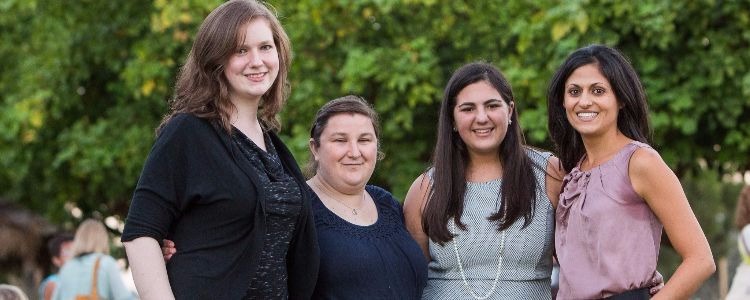BEDA/NEDA Conference Recap – Part 1!
The Binge Eating Disorder Association (BEDA) in partnership with the National Eating Disorders Association (NEDA) kicked off its 2017 National Conference in New York City. Titled “Building Resilient Communities Through Collaboration,” the day united survivors, caregivers, and treatment professionals for vital conversations about binge eating disorder (BED), body image and weight shaming, and marginalized communities.
Attendees kicked off the day with a powerful keynote titled, “Eating Disorders in Marginalized Populations: What is the Impact of Food Insecurity?” presented by Carolyn Black Becker, PhD, FAED, and Keesha Middlemass, PhD. Food insecurity occurs when a household is unable to access sufficient, safe, and nutritious foods. It exists on a continuum and is cyclical, meaning that someone who may be able to access nutritious food in the beginning of the month, they may not toward the end of the month.
Additionally, Dr. Becker pointed out that highly palpable foods are heavily marketed to people with lower income, which is problematic and often deeply unethical. Ultimately, eating disorders are directly correlated with food insecurity, as Drs. Becker and Middlemass found in their recent survey. Moreover, those who experience child hunger experienced elevated rates of vomiting and bingeing, use of laxatives, and concerns around weight.
Notably, the pair did not collect data on weight and health because collecting this information may have alienated members of this community, who already face weight stigma and may not have access to a scale. They also implored other professionals and researchers to ask themselves whether data on weight or height is really going to further their goals. If this data won’t affect the results of your research, consider not collecting it.
Drs. Becker and Middlemass made it clear that the common narrative of who gets an eating disorder excludes marginalized people. While efforts have been made to increase diversity in a field that has traditionally prioritized white, cisgender, upper class women, much work remains. The two hope that their work with marginalized people in San Antonio will inspire others to take action in the communities that most need it.
Shedding Light on Eating Disorders in Jewish Communities
Next, Temimah Zucker, LMSW, and Melissa Orshan-Spann, PhD, CEDS, led the general session called “Treating Eating Disorders within the Context of the Jewish Community.” While religiosity has a protective value within the Jewish community, there is also denial that eating disorders are happening and resistance to talking about the issue.
There is also a persistent paradigm of the Jewish mother emphasizing food at all times juxtaposed with a superwoman ideal (young, thin, white, wealthy, fashionable, etc.). Additionally, Zucker and Dr. Orshan-Spann brought up the “elephant in the room:” gender equality. Men are allowed to present themselves in different ways, but women’s roles tend to be focused more on outward appearance.
Therapists working with the Jewish community should attempt to reconnect their patients with an internal belief system. It can be helpful to help the patient move away from shame to a belief in something, and this can be done by using ritual in therapy. Examples include using storytelling to heal, and exploring the power of prayer.
Dietitians Speak Out for Body Diversity
Afterward, Sunny Sea Gold moderated a powerful panel on weight stigma and binge eating disorder called “Opening Doors to the Right Rooms.” Gold shared a personal anecdote about praying to God to deliver her from binge eating, or “gluttony” in the religion she grew up practicing.
“After all these years of recovery, I still grieve for the little girl who thought it was her fault,” she told the audience through tears. As Gold pointed out, people with BED are often missed or shut out of help because they’re not knocking on exactly the right door.
One of the panelists, Melissa Toler, PharmD, said she used to “pursue weight loss like a full-time job” because she believed it was her obligation as a woman. Toler also emphasized that the lives of people with marginalized identities can become even more complicated with diet culture. We all need to do our own anti-racism and anti-oppression work. You won’t always get it right and it’s okay if you don’t.
Aaron Flores, RDN, spoke to the fact that male dietitians often have a lonely road because there are so few of them. We are currently missing the language on how to make body and food issues accessible to men. Accessibility cannot occur without intersectionality, which would ensure that conversations can be had that incorporate our varied identities.
The Role Trauma Plays in the Development of Eating Disorders
I also had the opportunity to attend a breakout session titled, “Unsafe as a Way of Life: The Role of Complex Trauma in the Development of Binge Eating Disorder” presented by Amy Pershing, LCSW, ACSW. When treating people who have experienced significant trauma, it’s helpful to come from a place of empowerment to reduce stigma. C-PTSD is a psychological injury sustained from protracted exposure to prolonged social and interpersonal trauma. It involves feelings of lost control and helplessness, and danger is experienced as a way of life.
Moreover, 83% of BED patients reported some form of childhood maltreatment, according to a 2001 study. Common underlying beliefs of those who have experienced trauma include feelings of self-blame, weakness, and defectiveness. Bingeing is reported to temporarily stop these experiences of anxiety and shame. After the binge comes dieting, or the “correction” of what is wrong with the person who has experienced trauma.
Nevertheless, Pershing maintained that there is tremendous hope for healing from BED and complex trauma. Change is necessarily slow, as it has to do with wiring, not willpower. Clients should learn how to understand and label flashbacks, or implicit “remembering” of trauma brought on by an experience in the present. Treatment professionals should keep in mind that any challenges to the feelings of self-blame and shame around past events can be terrifying, and that trauma work is not a linear process. Professionals can explore with clients the way they want their bodies to heal, such as through yoga, drumming, choral singing, etc.
LGBTQ+ Populations and Eating Disorders
The last panel I attended today was “Competence and Confidence: Exploring the Intersections of LGBTQ+ Individuals and Eating Disorders” by Erin McGinty, MS, LPC, and Aimee Becker, BA. The two spent some time reviewing terminology (sex, gender identity, gender roles, etc.), presenting treatment professionals with definitions and resources to keep in mind when treating members of the LGBTQ+ community. McGinty and Becker encouraged the audience to ask themselves, “What and who does it benefit to endorse the dominant narrative of gender?”
The pair also delved into microaggressions, which are casual, everyday degradations against marginalized populations. In therapy, this could include over-identifying with queer clients (Ex: “I have a gay friend!”), warning about the dangers of identifying as LGBTQ+, assuming LGBTQ+ clients need treatment, and having a heteronormative bias. Everyone makes mistakes, but what matters is how you handle those mistakes. Own them, apologize for them, and move on.
Click here for a full list of today’s informative sessions. Stay tuned for another conference recap tomorrow, and remember: you can always follow the action on social media by searching #BEDA2017 and #BEDANEDA!
Diana Denza is a 2011 Fordham University graduate and NEDA’s senior communications associate.





